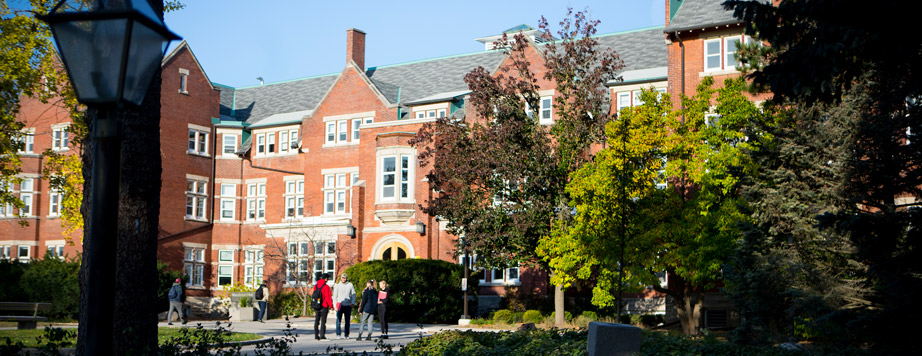
Our newly created “Admission Insights” articles aim to bring greater attention to international universities as viable options for students. While we’ve traditionally focused on US colleges, it’s also become clear that tremendous opportunities exist beyond our own borders that are worth a closer look. Here, through a series of interviews with admission officers, we provide key details about their schools and links where you may find more information.
. . . . . . .
1. Please share a brief overview of University of Guelph.
The University of Guelph is like no other university in Canada. Research-intensive and learner-centered, our campuses span urban hubs and rural communities. We are known for excellence in the arts and sciences, plus our commitment to developing exceptional thinkers and engaged citizens.
We have more than 29,000 undergraduate and graduate students at our campuses in Guelph, Toronto, and Ridgetown, including 1,400 international students from more than 120 countries. Our students and faculty pursue active inquiry across a range of disciplines: physical and life sciences, arts and humanities, social sciences, business, agricultural, and veterinary sciences.
Known for our safe campuses and supportive culture, U of G blends historical and modern architecture with cutting-edge technology. Our living and learning environments encourage exploration and the interdisciplinary sharing of new ideas. By focusing on the “whole student,” we give our graduates the tools to make a difference in our ever-changing world.
2. What is typically your percentage of enrolled international students?
Typically, our percentage of enrolled international students is about 5% and growing.
3. Are there any special requirements for international students versus domestic? If yes, please share them. e.g. In the US, we require a TOEFL score or equivalent.
Yes, in regards to admission standards, these requirements differ from country to country depending on what school system the applicant has attended. To demonstrate English proficiency, we accept IELTS, TOEFL and others. For IELTS, we require a minimum overall score of 6.5 with no band less than 6; for TOEFL, a minimum score of 89 with no individual scaled score less than 21.
Please see our website for more details on country-specific admission requirements: https://admission.uoguelph.ca/international/admreqs
4. What resources are available at your school to help support international students?
We have quite a few, which are simpler to list as follows:
- International Student Advisor
- English Language Support
- START International Orientation
- Immigration Documents and Permits
- Working in Canada
- On-Campus/Off-Campus Housing
- International Student Organization
- Paying your Tuition
5. Do you offer financial assistance or scholarships for international students?
Yes, we offer International Entrance Scholarships. To support the university’s strategic direction of internationalism, entrance scholarships are awarded on a competitive basis to students entering semester one of any degree program in the fall. Students must demonstrate high academic achievement as defined by a minimum admission average of 85.0% and not have attended a post-secondary institution. We also offer needs-based financial aid and bursaries.
6. Based on what you know of US universities, what would you say are some of the primary differences between Canada and the US?
The size of Canada’s top schools helps make the search for employment after graduation more of a level playing field. With exclusivity downplayed, there is not such a premium on hiring grads from certain schools. Higher education is on average cheaper in Canada than the US— especially for international students.
Canadian universities largely admit students based on their transcripts and grade point averages. If your grades at a Canadian high school pass the bar set by the university, then you’re in, without any need for letters of recommendation or essays at most schools. There is no Canadian equivalent of the SAT and ACT.
7. What would you say is unique or stands out about your university among others?
To highlight a few that we’re proud of…
First of all, our reputation. We are consistently ranked as one of Canada’s top Comprehensive Universities by Maclean’s Magazine. The University of Guelph offers over 100 graduate programs recognized as leaders in their respective disciplines.
Graduate funding. The success rate of Guelph students who apply for funding from the Natural Science and Engineering Research Council (NSERC), the Social Science and Humanities Research Council (SSHRC), and the Ontario Graduate Scholarship (OGS) program is consistently higher than the national/provincial average.
Our students have access to an extraordinarily wide range of information through the main Library’s many electronic resources and our innovative partnership with the University of Waterloo and Wilfrid Laurier University. The Tri-University Group of Libraries (TUG) provides access to a total of seven million volumes including our own collection of 2.5 million.
Our beautiful campus is located on 350 hectares of land in the heart of Guelph, Ontario. The self-contained campus is made up of charming traditional buildings and new facilities set amidst spectacularly landscaped grounds, phenomenal green space, and an Arboretum.
8. Have you found that graduates are well prepared for the international workplace upon completing their degree?
The University of Guelph provides many opportunities to meet with employers, especially through our Co-Op Program. For more information, please visit: https://cecs.uoguelph.ca/
*For more information, be sure to visit our University of Guelph Profile



